Book contents
- Frontmatter
- Contents
- Preface
- A Brief Biography
- Contributors
- Glossary
- Introduction: Researching the Margins
- Bibliography of Charles Coppel's Work
- 1 Anti-Chinese Violence and Transitions in Indonesia: June 1998–October 1999
- 2 Reconstituting the Ethnic Chinese in Post-Soeharto Indonesia: Law, Racial Discrimination, and Reform
- 3 Buddhism and Confucianism in Contemporary Indonesia: Recent Developments
- 4 Portrait of the Chinese in Post-Soeharto Indonesia
- 5 The Makam Juang Mandor Monument: Remembering and Distorting the History of the Chinese of West Kalimantan
- 6 Confucianists and Revolutionaries in Surabaya (c1880–c1906)
- 7 The Chinese and the Early Centuries of Conversion to Islam in Indonesia
- 8 The Agony of Love: A Study of Peranakan Chinese Courtship and Marriage
- 9 Peranakan Chinese and Wayang in Java
- Index
4 - Portrait of the Chinese in Post-Soeharto Indonesia
Published online by Cambridge University Press: 21 October 2015
- Frontmatter
- Contents
- Preface
- A Brief Biography
- Contributors
- Glossary
- Introduction: Researching the Margins
- Bibliography of Charles Coppel's Work
- 1 Anti-Chinese Violence and Transitions in Indonesia: June 1998–October 1999
- 2 Reconstituting the Ethnic Chinese in Post-Soeharto Indonesia: Law, Racial Discrimination, and Reform
- 3 Buddhism and Confucianism in Contemporary Indonesia: Recent Developments
- 4 Portrait of the Chinese in Post-Soeharto Indonesia
- 5 The Makam Juang Mandor Monument: Remembering and Distorting the History of the Chinese of West Kalimantan
- 6 Confucianists and Revolutionaries in Surabaya (c1880–c1906)
- 7 The Chinese and the Early Centuries of Conversion to Islam in Indonesia
- 8 The Agony of Love: A Study of Peranakan Chinese Courtship and Marriage
- 9 Peranakan Chinese and Wayang in Java
- Index
Summary
INTRODUCTION
On Saturday, 8 March 2003 about 200 members of two paramilitary gangs demonstrated outside Tempo weekly magazine's office in Pegangsaan, Jakarta. A number of them, escorted by police, entered the building and met with some of the editors. Later, they went to the local police station and continued the meeting. Both in the Tempo office and the police station the leaders of these gangs harassed and physically attacked a number of the Tempo editorial staff. This took place in front of the police but the police did not intervene (Jakarta Post, 2003a,b; Tempo Interaktif, 2003a).
One gang belonged to the Artha Graha Group (a business company owned by Chinese konglomerat Tomy Winata) and the other was the Banteng Muda Indonesia (Young Wild Bulls of Indonesia), a paramilitary organization associated with PDI-P (Partai Demokrasi Indonesia — Perjuangan or the Indonesian Democratic Party — Struggle). A few days before the attack, Tempo had written a story in its 3 March edition, indicating that Artha Graha Group might be implicated in a fire which had broken out the previous month at the huge textile market in Tanah Abang, Jakarta. Prior to the fire, Artha Graha, according to Tempo, had signed a contract to renovate this market. In its article, Tempo reported rumours about the possible involvement of the Artha Graha Group in the fire, together with Tomy' rebuttal (Jakarta Post, 2003b). Tomy has since successfully sued Tempo, claiming damages for calling him a “big scavenger” (Jakarta Post, 2003a,d).
The brutal attack resulted in popular anger directed at Tomy Winata. However, fuelled by a latent anti-Chinese sentiment, this soon transformed into anger at all ethnic Chinese. People felt that Winata's actions were “typical Chinese” behaviour, especially for Chinese businessmen.
- Type
- Chapter
- Information
- Chinese IndonesiansRemembering, Distorting, Forgetting, pp. 95 - 104Publisher: ISEAS–Yusof Ishak InstitutePrint publication year: 2005

